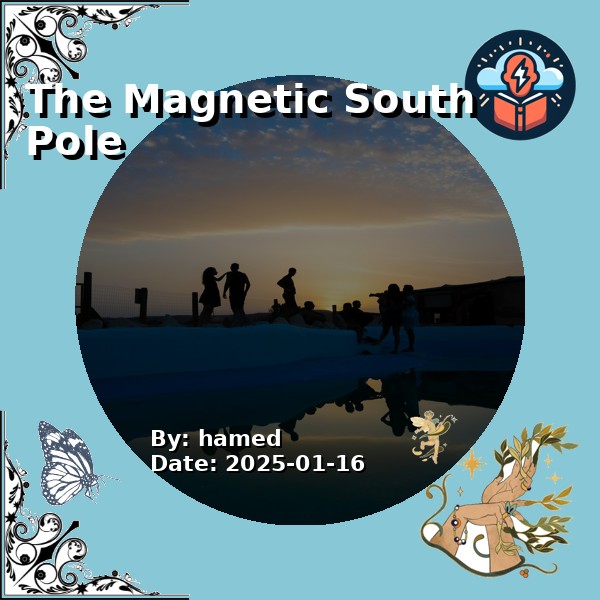Dr. William Harper sat in the dimly lit cabin, his breath fogging in the cold air that seeped through the cracks in the wooden walls. He gazed out the small, frosted window at the vast, white nothingness beyond. The Antarctic night was long, a canvas of endless ice stretching out like a frozen sea. The world felt smaller here—compressed, as though the weight of the icy landscape could crush the very spirit from a man.
He was supposed to be a part of history. The first to reach the Magnetic South Pole. A dream he’d nurtured for years. But now, standing on the precipice of that dream, William felt the weight of reality pressing against him. Shackleton had already failed. Others before him had turned back, too—men of greater renown, more experience. Yet here he was, alone with a few fellow scientists, still determined to forge forward.
He pulled his parka tighter around his shoulders and paced the small cabin, his boots crunching in the snow with each step. The journey had been brutal—unforgiving winds, blinding snowstorms, crevasses that threatened to swallow them whole. The supply depots they’d carefully placed had been buried in the constant drift. The frostbite that gnawed at their fingers and toes. Every day was a battle to survive.
“Dr. Harper?” A voice broke through his thoughts. It was Thomas, one of the younger scientists, his face pale from weeks of isolation and bitter cold. “Are we really going to continue? With the storm coming… I don’t know if we’ll make it.”
William looked into the wide, uncertain eyes of the young man. He was just a boy, really—no older than twenty. Yet here he was, stuck in the frozen void of the polar expanse, unsure whether the dream was worth the cost.
“I don’t know, Thomas,” William said, his voice softer than he intended. He walked over to the table, where a map of their route lay pinned, the red lines of their progress stark against the white expanse. “I thought I did. Thought it was all for something—discovery, glory, making a name for ourselves.”
He looked at the map, his fingers tracing the path they had taken, a winding trail toward something that seemed more elusive with each passing day.
“But now,” he continued, “it feels like we’re just marching into oblivion.”
Thomas sat down heavily on a nearby crate, exhaustion etched into his face. “What if we turned back?”
The thought had crossed William’s mind more times than he cared to admit. It was a tempting thought—return to civilization, to warmth and food and safety. But then he thought of the Magnetic South Pole. Of the glory that awaited any man brave enough to set foot there, the knowledge that they had achieved what so many before them had dreamed of but never accomplished.
“Turning back means we’ll never know,” William said, the words sharp in the still air. “We can’t give up now. We’ve come too far. It’s just beyond that ridge. A few more days, and we’ll be there.”
But even as the words left his mouth, he doubted them. The storm was growing stronger outside. His body ached with the weariness of days that had blurred together, and the cold was seeping into his bones. He could hear the wind howl as it scraped against the cabin, a relentless reminder that the elements here didn’t care for ambition, didn’t care for dreams.
The fire in the small stove crackled weakly, casting long shadows across the walls. William sat down on his bunk, his eyes closing for a moment, just long enough for the weight of the journey to press down on him. He had dreamt of this his entire life—the adventure, the discovery, the honor. But now, as the bitter cold gnawed at him, he wondered if he had ever truly understood what it meant to be here.
“Dr. Harper,” Thomas said again, his voice small but full of a quiet resolve. “If we don’t go on… will you regret it?”
William’s heart clenched. Regret? That was the thing, wasn’t it? The fear of never knowing, of never reaching the goal that had driven him this far.
He stood slowly, feeling the weight of his pack press down on him as though it were a decision, a burden he hadn’t yet made. His mind raced with the thoughts of his colleagues, of the expedition’s legacy, of the history they would write. He had dreamed of being a part of that, of being remembered, of achieving the impossible.
But now, staring out into the void of snow and ice, the question had shifted. It wasn’t about glory anymore. It wasn’t about discovery. It was about survival. About the men who had trusted him to lead them through this frozen wasteland.
“I don’t know, Thomas,” he said, his voice thick with uncertainty. “But I’ll tell you this—we don’t have to do this alone. We decide together.”
For the first time in days, he felt a flicker of warmth—an ember of solidarity between them. The storm howled outside, but inside, in the cold and the dark, the weight of their shared journey felt a little lighter.
The Magnetic South Pole wasn’t just a place on a map anymore. It was a test—of what it meant to be human, to face the unknown, and to decide, together, whether the dream was worth the cost.
Tomorrow, they would decide whether to keep going or to turn back.
